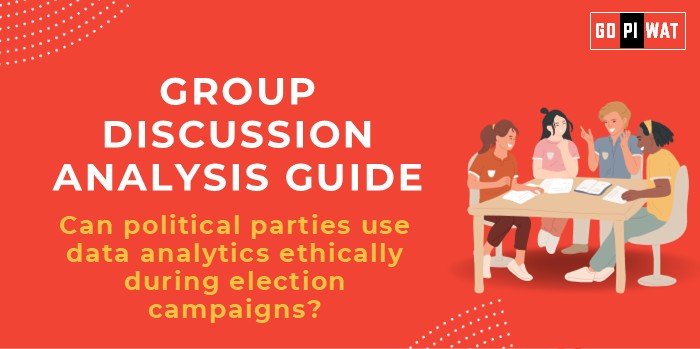📋 Group Discussion (GD) Analysis Guide
🌐 Can Political Parties Use Data Analytics Ethically During Election Campaigns?
🌟 Introduction to the Topic
- ⚖️ Opening Context: “As election campaigns become increasingly digitized, the role of data analytics in shaping political strategies has drawn significant attention. While offering precision targeting, it raises ethical concerns about data privacy and manipulation.”
- 📜 Topic Background: The use of data analytics in elections gained global prominence with Barack Obama’s 2012 campaign and later controversies like Cambridge Analytica in 2018. In India, political parties have embraced data analytics for voter outreach, leading to debates on ethical boundaries.
📊 Quick Facts and Key Statistics
- 🌍 Global Data Economy: Valued at $271 billion in 2023, underscoring the influence of data in decision-making.
- 🇮🇳 Indian Voter Base: Over 900 million eligible voters in 2024 elections; 650+ million active internet users.
- 🔒 Data Breaches: 2,000+ breaches globally in 2023, highlighting risks in data handling.
- 📊 Digital Ad Spending: Estimated ₹4,000 crore in 2024 elections in India.
🤝 Stakeholders and Their Roles
- 🏛️ Political Parties: Use data to strategize campaigns and target voters.
- 💻 Tech Companies: Provide analytics tools and platforms for data analysis.
- ⚖️ Government Agencies: Regulate data usage and ensure compliance with laws.
- 👥 Voters: Supply data inadvertently through social media and apps.
🏆 Achievements and Challenges
✨ Achievements:
- 🌟 Increased Voter Engagement: Personalized messages led to a 10% higher voter turnout in urban areas in 2019.
- 📊 Effective Resource Allocation: Parties could focus on key swing states.
- 📱 Social Media Impact: Enabled direct connection with young voters.
⚠️ Challenges:
- 🔓 Privacy Violations: Cases of unauthorized voter profiling have surfaced.
- ❌ Misinformation Risks: Amplified by targeted fake news campaigns.
- ⚖️ Regulatory Loopholes: Lack of stringent data protection laws in many democracies.
🌎 Global Comparisons:
- ✔️ United States: Advanced data use but controversies like Cambridge Analytica.
- ✔️ Estonia: Ethical data practices with voter trust as a cornerstone.
💡 Structured Arguments for Discussion
- ✔️ Supporting Stance: “Data analytics enables efficient campaigns and boosts democratic participation through targeted outreach.”
- ✖️ Opposing Stance: “Unethical data use erodes trust, compromises privacy, and may manipulate voter behavior.”
- ⚖️ Balanced Perspective: “While data analytics optimizes campaigns, ethical frameworks and transparency are essential to safeguard democracy.”
🗣️ Effective Discussion Approaches
- 🎯 Opening Approaches:
- 📊 Use impactful statistics: “With over 900 million eligible voters, ethical data use is pivotal for democratic integrity.”
- 📚 Case-based opening: “The Cambridge Analytica scandal exemplifies the misuse of voter data.”
- 💬 Counter-Argument Handling:
- Acknowledge benefits but highlight risks with examples like GDPR’s role in addressing data misuse.
🔍 Strategic Analysis (SWOT Framework)
- 💪 Strengths: Precision targeting; enhanced voter outreach.
- ⚡ Weaknesses: Privacy risks; dependence on tech platforms.
- 🌟 Opportunities: Strengthening ethical norms; leveraging AI for fair campaigns.
- ⚠️ Threats: Public backlash; increased regulatory scrutiny.
📚 Connecting with B-School Applications
- 📖 Real-World Applications: Insights for projects in marketing ethics, tech policy, and data governance.
- 🎓 Sample Interview Questions:
- ❓ “How should political parties balance data use with ethical considerations?”
- ❓ “What lessons can businesses learn from political data scandals?”
- 💡 Insights for Students:
- Analyze ethical AI frameworks.
- Study case laws on data breaches.
- Propose innovative regulatory solutions.


